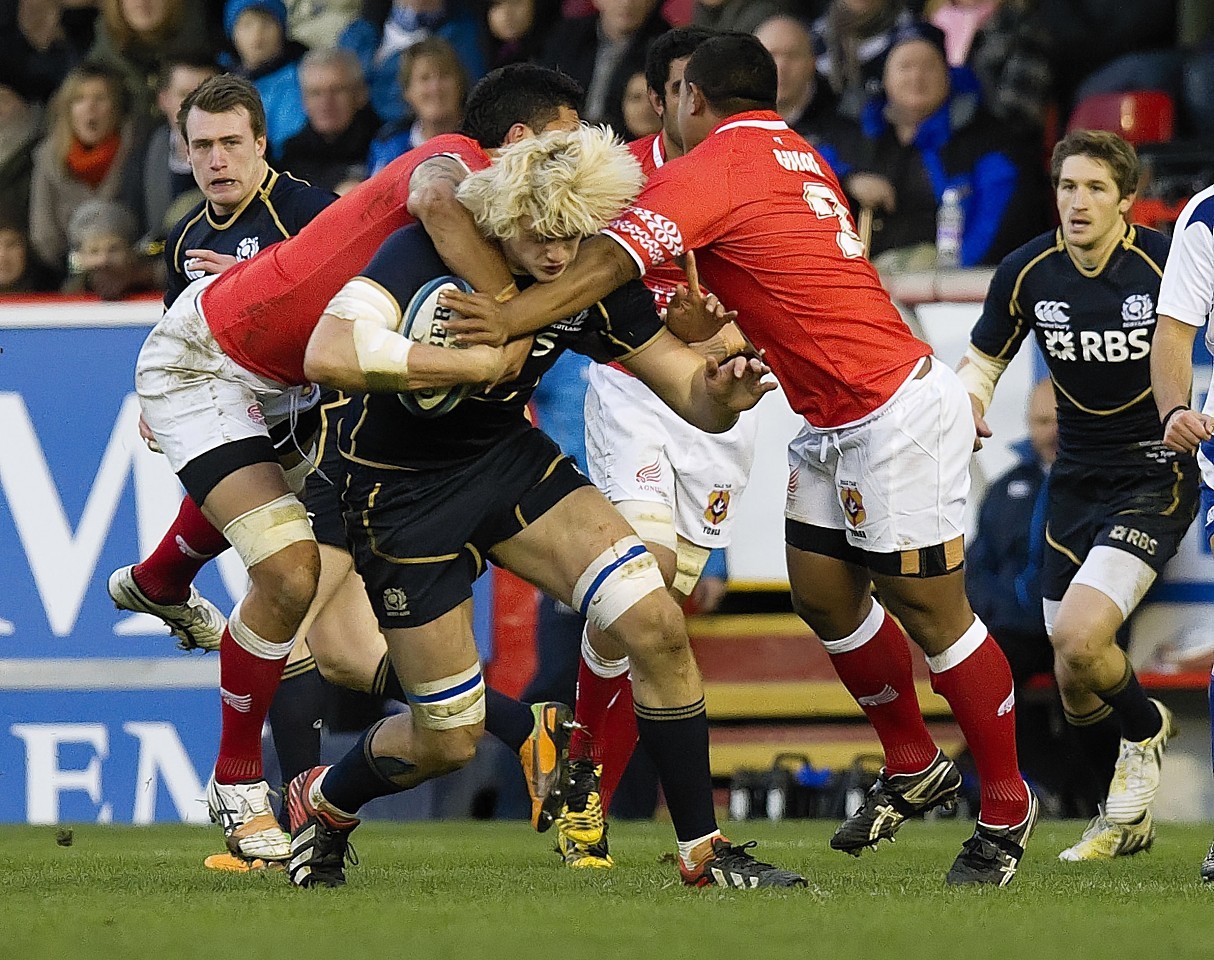Scotland’s two-year wait for the chance to redeem themselves is almost at an end.
November 24, 2012, is a date etched in Scottish rugby history – for all the wrong reasons. It’s certainly one Andy Robinson will not forget in a hurry.
Pittodrie Stadium in Aberdeen was the venue for an abject Scottish display which ended with the Scots suffering a mortifying 21-15 defeat by Tonga.
Robinson resigned as head coach the next day but current incumbent Vern Cotter has warned the Tongans will be even tougher opponents than they were in the Granite City when they line up against the Dark Blues on an artificial surface at Kilmarnock’s Rugby Park tomorrow.
The Sea Eagles have beaten Georgia and the US in their last two outings and Cotter admits the very mention of Tonga is still enough to make several members of the Scots squad shudder.
“That match has been talked about,” said Cotter.
“I know the players were disappointed with that result two years ago. There is a quiet determination among them to play well. Tonga are a better team than they were then. They almost come into the match as favourites. They have won their last two games.
“We know it will be difficult. We haven’t viewed the footage of that match two years ago but we know their players and are very aware of what they have done in that last two games.”
“Beating Georgia is very hard and they put 40 points on the States. Their game plan has evolved. Because of the pitch and because of the opposition, this match will be different to the ones against Argentina and New Zealand. We will have to adapt.”
Cotter claims his side will be the underdogs. The Dark Blues have home advantage for the match as well as the bragging rights when it comes to the current IRB Rankings – with four rungs separating the eighth-placed Scots from their weekend guests.
But despite encouraging Scotland displays against Argentina and New Zealand, Cotter reckons the Pacific Islanders are the favourites to win the final autumn Test.
The match is e the first major Test to be played on a synthetic surface. But Kilmarnock’s pitch is not the only thing concerning Kiwi Cotter.
He added: “We have spoken about the fact this could be the danger game. It was easy for the guys to get themselves up for Argentina because it was the first game of the series and then the All Blacks. But now we have shifted away from Murrayfield and changed the environment.
“At the same time, though, I think the players are enjoying having to prepare for another game away from home as we will have to at the World Cup.
“There is an opportunity to prepare well and execute well in a difficult situation so, mentally, we will have to be resilient. It will be fascinating to see how we deal with it.”
Injuries have forced the Scotland coach into four changes.
Tighthead prop Geoff Cross and number eight Johnnie Beattie come into the pack for Euan Murray and Adam Ashe, who miss out through thigh and neck injuries respectively.
In the backs, 90-cap Glasgow Warrior Sean Lamont replaces clubmate Mark Bennett after the centre was ruled out for 12 weeks with a hamstring injury, while Edinburgh wing Tim Visser makes his first appearance since the summer tour in place of the injured Sean Maitland, also ruled out by a hamstring strain.
But Cotter has warned the newcomers the men they are replacing have set the bar high.
He said: “The guys who have played have done well. They are setting standards within the group, so we didn’t want to change it too much.
“But injuries give the players coming in a chance. The natural competitors in them will show through.
“They realise the players carrying the jersey in the two previous games have played well but they now have a chance to stake a claim.
“They have the six nations coming up but there is also the World Cup not far away, so I’m sure they will have that in the back of their minds.”
Cotter’s men will get their first look at Killie’s 3G surface this morning but the head coach does not see artificial surfaces becoming the norm on the international stage.
Instead, he reckons the kind of hybrid surface recently installed at Murrayfield will become more and more popular with the leading nations.
He said: “When you look what has been done at Murrayfield with a combination of the two types of pitch, that seems to be the best answer. The Aviva in Dublin has it as well and I think that is where we are heading. Like anything, a combination of two good ideas works best.”
